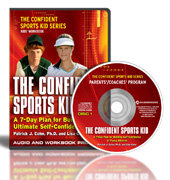Sports parents: Want to improve your young athletes’ confidence? Watch Dr. Patrick Cohn of The Ultimate Sports Parent discuss how sports parents can help kids boost self-confidence in sports and what not to do prior to games. Get a free report “10 Tips to Improve Young Athletes’ Confidence and Success in Sports by visiting Youth Sports Psychology

 At
At  Confidence is the Number One trait that determines whether kids enjoy sports and succeed it in, says Patrick Cohn, Ph.D. a leading sports psychology expert and co-founder of the
Confidence is the Number One trait that determines whether kids enjoy sports and succeed it in, says Patrick Cohn, Ph.D. a leading sports psychology expert and co-founder of the 